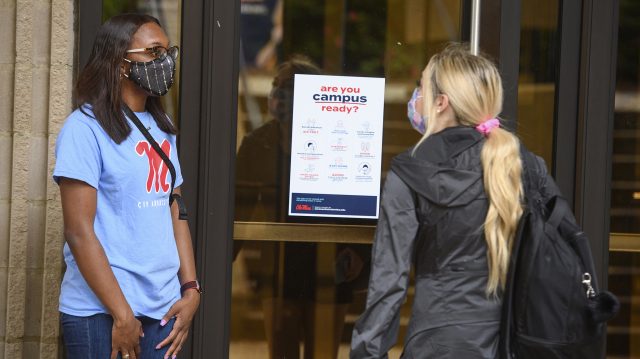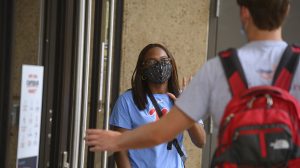
C19 Ambassador Micaela Shields, a sophomore biochemistry major from Olive Branch, greets students as they arrive to class in Lamar Hall. Photo by Thomas Graning/Ole Miss Digital Imaging Services
OXFORD, Miss. – University of Mississippi students, faculty and staff returning to campus no doubt have noticed smiling – although masked – faces greeting them as they enter many buildings and common gathering spaces.
These greeters are C19 Ambassadors, volunteers from the university family who are stationed around campus to ensure that common spaces are clean and everyone has access to masks and hand sanitizer.
“Imagine being greeted at the door by a Walmart greeter,” said Joshua Tucker, one of the program’s administrators and graduate assistant to Natasha Jeter, assistant vice chancellor for wellness and student success.
“These ambassadors are going to be standing outside the entrances to remind students to wear masks or provide disposable masks for anyone without. They will also monitor building capacities and supplies. Our purpose is an initiative to allow students, staff and faculty to share in the responsibility of the health of the Ole Miss family – that’s students, faculty, staff or visitors.”
Tucker worked alongside Jeter to create the C19 program as one of many efforts to prevent the spread of COVID-19 on campus and keep the university community safe. Volunteers include representatives from the student body, faculty and staff, something Tucker said is key for building buy-in.
“I think this is important for everyone to be involved, because when March came around, we all had to go home,” he said. “Everyone came to the University of Mississippi for a reason and they want their full college experience.
“If this initiative is a success and everyone plays a part, then we can achieve that college experience we’re so accustomed to.”
Anyone in the university community can volunteer to be a C19 Ambassador. Volunteers pick their own one-hour shift between 7:45 a.m. and 5 p.m. Monday through Friday. They receive community service credit hours, recognition through the Division of Student Affairs and a powder-blue T-shirt with the university’s scripted M logo to identify them as C19 Ambassadors.

Micaela Shields (left) said she volunteered as a C19 Ambassador because she wants to put action behind her optimism for the fall semester. Photo by Thomas Graning/Ole Miss Digital Imaging Services
Micaela Shields, a sophomore biochemistry major from Olive Branch, volunteered because she wants to put action behind her optimism for the fall semester.
“I am optimistic about our outcomes,” she said. “I like the campus. I like being here, and I believe we can all come together and have a fighting chance for a positive outcome.
“These aren’t desirable day-to-day routines, but we can have a positive impact, and that’s where we come in, to encourage students to work toward a better outcome.”
Shields is a liaison ambassador, which means she is in the leadership group that communicates between Tucker and Jeter and the rest of the volunteers, as well as helping with administrative duties.
Hannah Allen, assistant professor of health promotion and a liaison ambassador, has a doctorate in public health with a focus in behavioral and community health, so she was very interested in the C19 program when she began her new job at the university earlier this year.
“When I first got here, I looked at the campus protocols and I was pleased to see how comprehensive the plan was,” Allen said. “I thought it really prioritized the health and safety of everyone in the community, and when I saw the C19 program, I was even more excited because, as a health promotion professional, seeing a campus-based initiative is a great example of community health at work.”
Allen said that the C19 Ambassador program is in line with what she knows about public health programming.
“People are highly influenced by their peer groups when it comes to health behavior change,” she said. “They’re more likely to adjust their actions when they see their peers adopting healthy behaviors as well.
“I think we’ll see success because this initiative follows everything I’m familiar with in what makes an effective health education program.”
Anyone interested in becoming a C19 Ambassador can register here.